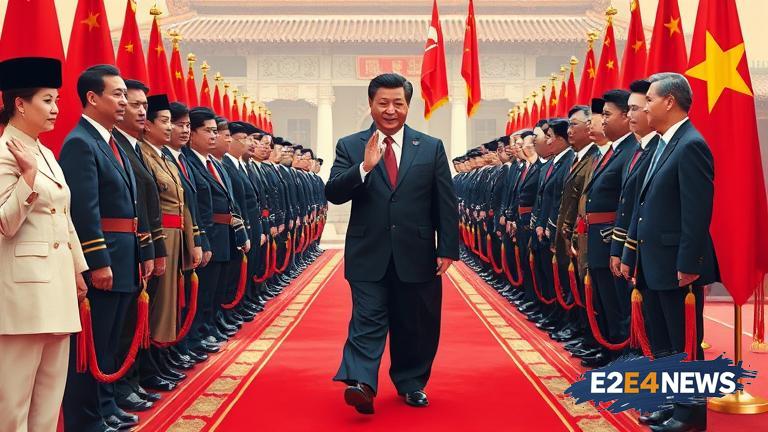In a grand display of diplomatic pageantry, Chinese President Xi Jinping has been hosting a slew of foreign leaders in Beijing, underscoring the country’s rising stature on the world stage. The high-profile visits have been carefully choreographed to showcase China’s growing economic and military might, as well as its expanding influence in global affairs. With the United States and other Western powers increasingly wary of China’s ascendance, Xi’s diplomatic overtures are seen as a strategic move to bolster the country’s international reputation and build alliances with like-minded nations. The visiting dignitaries have been treated to lavish receptions, complete with pomp and circumstance, as Xi seeks to project an image of China as a confident and responsible global player. The diplomatic charm offensive has been accompanied by a slew of trade and investment deals, highlighting the vast economic opportunities that China has to offer. As the world’s second-largest economy, China is increasingly flexing its muscles, using its vast financial resources to woo foreign leaders and secure strategic partnerships. The visits have also provided a platform for Xi to promote his signature Belt and Road Initiative, a massive infrastructure development project aimed at connecting China with other parts of Asia, Europe, and Africa. With its vast network of roads, railways, and sea routes, the initiative is seen as a key driver of China’s economic growth and a means of expanding its geopolitical influence. As China’s global footprint continues to expand, the country is facing growing scrutiny from the international community, with concerns over its human rights record, trade practices, and military expansion. Despite these challenges, Xi remains committed to his vision of a more assertive and influential China, one that is capable of shaping global events and promoting its own unique brand of socialism. The diplomatic push is also seen as a response to the growing rivalry between China and the United States, with both nations vying for dominance in the Asia-Pacific region. As tensions between the two superpowers continue to escalate, Xi’s diplomatic efforts are aimed at building a coalition of like-minded nations that can counterbalance American influence. The visits have been marked by a series of high-level meetings, with Xi holding talks with his counterparts on a range of issues, including trade, security, and climate change. The diplomatic engagements have also provided an opportunity for China to showcase its cultural and historical heritage, with visiting leaders being treated to tours of the country’s ancient landmarks and cultural institutions. As China continues to navigate the complexities of the global landscape, Xi’s diplomatic efforts are seen as a key component of the country’s long-term strategy, one that is aimed at promoting its national interests and securing its place as a major world power. With its growing economic and military might, China is increasingly poised to play a more prominent role in global affairs, and Xi’s diplomatic push is seen as a key driver of this trend. The visits have also highlighted the growing importance of China’s relationships with its neighbors, with the country seeking to build stronger ties with nations in the Asia-Pacific region. As China’s global influence continues to expand, the country is facing growing expectations from the international community, with many nations looking to Beijing to play a more active role in addressing global challenges. Despite the challenges and complexities of the global landscape, Xi remains committed to his vision of a more confident and influential China, one that is capable of shaping global events and promoting its own unique brand of socialism. The diplomatic push is also seen as a response to the growing trend of anti-globalization and protectionism, with China seeking to promote its own brand of globalization and free trade. As the world’s second-largest economy, China is increasingly seen as a key driver of global growth, and Xi’s diplomatic efforts are aimed at promoting the country’s economic interests and securing its place as a major world power.
